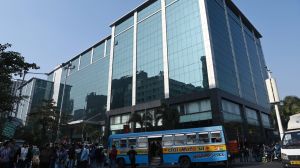Go, for service146;s sake
Former Mumbai police commissioner Julio Ribeiro asks Maharashtra DGP P.S. Pasricha to step down even if the inquiry exonerates him of corruption charges. Damage to the service should be his main concern, he says

There was a time when Parvinder Singh Pasricha used to hit the headlines because of his proven expertise in traffic control. The management of traffic in Mumbai City was much better when he was the traffic chief. Now Pasricha has made the front page of all local dailies for the wrong reasons. He is said to be dabbling in the purchase and sale of real estate.
The citizens of the city will form the impression that the state8217;s police chief has indulged in large-scale corruption. Even if that is not so, public opinion is against him. Nothing can be proved from the facts disclosed in the 8216;sting8217; operation, except that Pasricha has spent considerable time on buying and selling real estate and has probably missed his real vocation in life. As for corruption, it can only be presumed if the prices he has paid were much below the market rates prevailing at those times.
The community to which Pasricha belongs is adept in business and trade and makes a good living out of this traditional occupation. The problem lies in the fact that the common man does not expect police leaders to be anything other than good policemen. By buying and selling flats, Pasricha has let them down and in the process brought the police service into further disrepute.
I used the adjective 8216;further8217; because a disproportionately large number of senior officers have contributed of late to the poor reputation which the Indian Police Service has recently acquired. A police commissioner was arrested on the day after he retired from service. A joint commissioner of police, trained at an IIT and IIM, was arrested for corruption. An additional commissioner of police was suspended and charged for trying to extract money from his own subordinate and also for possessing property disproportionate to his known source of income. An Addl DGP in line for the top job was trapped by the Anti-Corruption Bureau where he himself had served.
A DCP came to public notice for demanding more 8220;haftas8221; from bar owners. The latter went in a morcha to his office protesting against his demands. Another let off bookies who had been rounded up by an inspector when they had gathered for a strategy meeting in a hotel room before the last cricket World Cup. No action was taken by the government despite the adverse publicity. Very recently a chairman of a cooperative housing society in Versova was arrested wrongfully because some lakhs of rupees were found in a suitcase abandoned on the terrace of his building. The magistrate found no cause of action and discharged those who had been arrested but the chairman was summoned by the additional commissioner and threatened. His troubles ended only after he 8216;befriended8217; the officer!
Reverting to Pasricha8217;s case, one notes that the rot began when he sold his society flat near the Mantralaya for Rs 1.50 crore when he had spent just a couple of lakhs on its purchase. People will wonder how IAS and IPS officers can purchase flats for such meagre amounts in prime locations. Expecting its senior officers to remain always honest the government bequeaths government land at nominal lease rent to societies founded by IAS and IPS officers. The officers have to spend only on construction costs. Thereafter, the officers can neither rent nor sell the flats but all this changed when politicians, cutting across party lines, also acquired buildings for their societies on similar terms and conditions but openly flouted the rules and finally had them shelved!
This led to commercialisation of the worst type. Officers not really in need of accommodation bought the flats because of the throwaway prices. On Worli Seaface a flat purchased for Rs 3.15 lakh in 1985 was sold by a retired DGP of the state to the son of a retired police commissioner for Rs 3.15 crore! One wonders whether the government should permit such mercenary transactions without extracting its pound of flesh. After all, the land and the money belong to the people.
Further the government needs to talk to its IAS and IPS officers and enforce all the rules and regulations which are now being openly flouted. Officers were not permitted to use government vehicles for private purpose and in the past their wives and children never used government cars. But now vehicles are placed exclusively at the disposal of senior ladies. Every officer was permitted two policemen as house orderlies but many have four or more at the cost of the tax payers and keep them after retirement or when they are on deputation which is not permissible. When government permits such infractions because they are considered minor, defiance of authority and rules becomes the norm and leads to indiscipline, which is infectious and travels down the line.
My advice to Pasricha is that in the interest of the police service he should step down even if the inquiry exonerates him from corruption charges. The damage to the service should be his main concern. And finally, why does the government not place all property returns filed every year by IAS and IPS officers on a website so that anyone who wishes to challenge the facts can do so? Good governance demands transparency, particularly from its senior officials.
- 01
- 02
- 03
- 04
- 05































